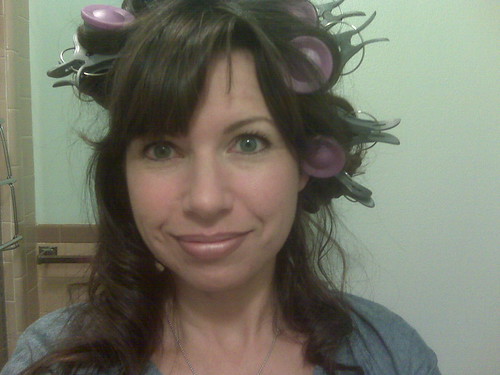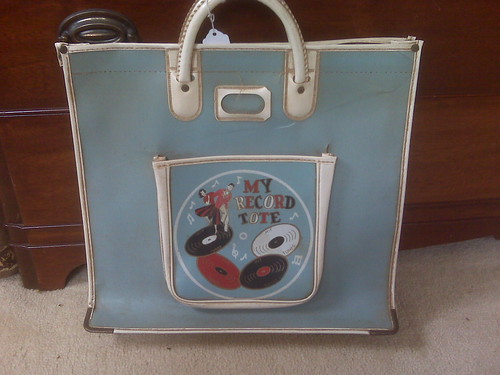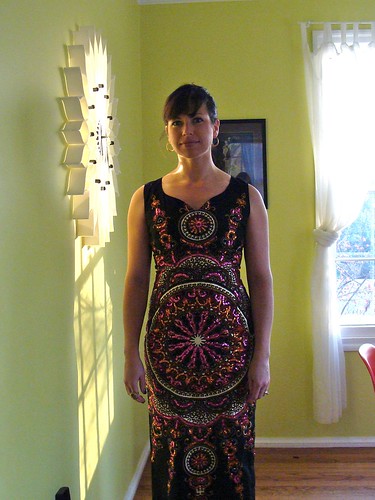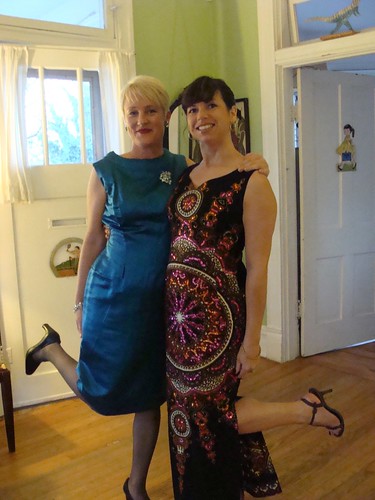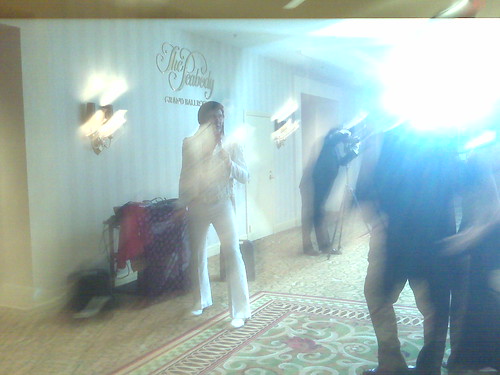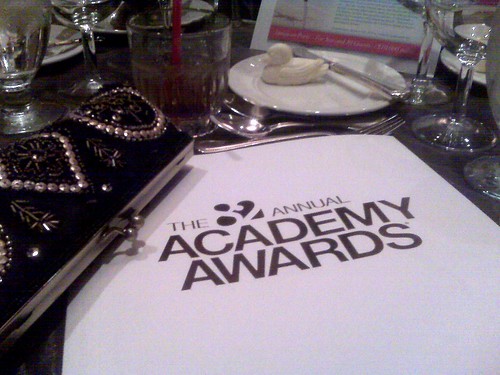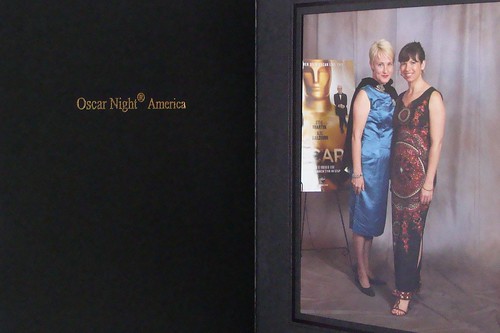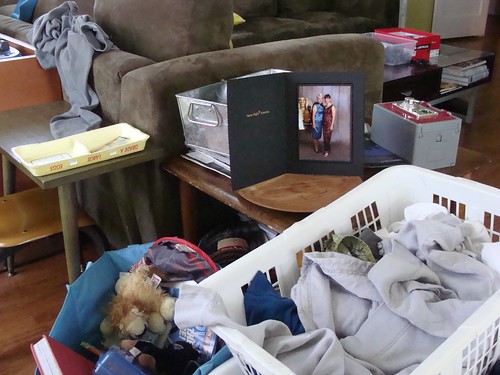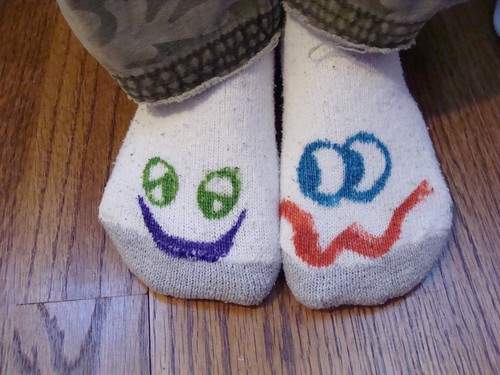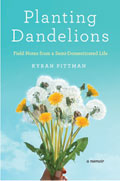Wielding Authenticity
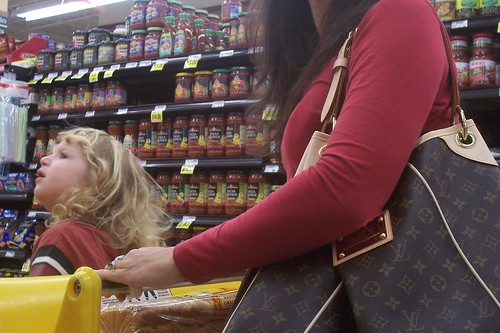
Several weeks ago, the supermarket in our old neighborhood closed for renovations, diverting most of its customers to the supermarket in our new neighborhood. I was a regular at the former supermarket for a decade. It mainly served three concentric populations within a five mile radius: the affluent liberal white population of mile one (think Volvos and hybrids with Sierra Club and Obama bumper stickers), the less affluent hipster and hippie population of miles two to three (think Vespas and bicycles with trailers), and those on the outermost rim (food stamp recipients arriving by cab and city bus).
Our new neighborhood is located in one of the wealthiest zip codes in the city. It has little independent markets where you can buy artisan bread, imported delicacies, fresh fish and specialty meats, but the big chain supermarket, located about a half mile from the Country Club, is well-appointed and does brisk business. After we moved, it took me a while to make the switch. Being in the new store made me cranky. The aisles were unfamiliar. It was too big. I was sure the prices were higher. And the customers were different. The parking lot was full of Land Rovers and Escalades. High heels clicked smartly over the polished floor, designer bags hung from shoulders. I was intimidated. I felt conspicuous handing my coupons over at the checkout, feeling certain that the customers behind me were wondering who let riff-raff like me in.
After a while, the strangeness, and my defensiveness, wore off. I came to appreciate the spacious aisles and wider selection of food, the great deli and sushi counter, and to see that mine was not the only non-luxury vehicle in the parking lot, nor was I the only coupon clipper (thank you, recession, for making frugal fashionable). I acclimatized, to the point that I was shocked at how small and run-down the old supermarket seemed when I ran in there to buy a bottle of water one day. I guess you can't go home again.
Since its closure, I've been getting to revisit the whole experience on a hugely magnified scale. The first week the diaspora hit, it was a culture clash of epic proportion, like Muggle and Wizard worlds colliding, with everyone walking around looking dazed and bewildered. I noticed (or imagined) many of the refugee shoppers also looked hostile or defiant, like they just dared Mrs. Louis Vuitton Bag to make something of their nose piercing or WIC card. I feel you, I telegraphed with my smile, thinking they'd recognize me as an ally. Peace out. Then I realized Mrs. Louis Vuitton Bag was me.
Some of you remember my first feature article for Good Housekeeping was a piece about investment dressing, in which I got to try and keep several high-end designer garments, including one utterly over-the-top, humungous LV bag. I wrote about my initial qualms over it and my subsequent conversion experience in the article, which you can read here. Two years later, "Louie" is my constant companion, so much so, that I take him for granted. I forget that a bag like that is a "statement bag." To me, it's a roomy, durable, comfortable tote, with a great story and fond memories attached to it. I wear it pretty much everywhere, and occasionally I get a look from someone to whom it means something else: Land Rover in the parking lot, gold card in my wallet, french country mcmansion for a home. When I sense that assumption coming my way, I almost want a bumper sticker for Louie that says "my other bag is a hemp sack." At such times, I enjoy a private chuckle over the irony of carrying a $1500 "it" bag while driving a seven-year-old minivan, in which the door handles are still futzed from being broken into last summer, so that I have to roll down my driver's side window to unlatch the door from the outside. I sort of wish the person I perceive to be sneering would follow me out to the parking lot and see my posh ride, but I don't believe my car makes a "statement" any more than my bag does. Nor do the contents of my wallet, the style of my house, or the numbers of my zip code.
It just happens to be. My circumstances are not reliable indicators of my values, my experiences or my character. They are simply circumstantial.
I paid lip service to that idea for years without realizing just how unevenly I applied it.
I was recounting my grocery store transition to my friend Heather recently, who saw my initially defensive attitude for what it was, and put it all too well. "Ah, so you thought you were too good for the rich people in that store, is that it?"
Ouch. Yes, that was it.
I've had a chip on my shoulder about wealth and privilege for most of my life. My father, consciously or unconsciously, passed on the belief that affluence amounts to greed. Money wasn't just the root of all evil; it was evil. You can imagine this has made it difficult to hang onto any. To illustrate, when I pitched that investment dressing article, and the magazine went for it, allocating a budget beyond anything I had in mind (I thought I might be able to borrow a few designer samples for a couple of weeks), I actually wrote my editor in a panic, suggesting that the magazine raffle the wardrobe off for charity. Because, God knows, having just sold our home to avoid foreclosure, hanging by our fingernails on the brink of bankruptcy, and in possession of a wardrobe that was half-Savers, half-Target, I couldn't accept something beautiful, expensive and well-made. Not when there was suffering in the world. In other words, I was too good for it. Practically a saint.
It's really hard to root out something that's embedded that deep. But I'm working on it. A lot of things shifted for me when I wrote that article, both professionally and personally (so much for setting out to prove how superficial and irrelevant fashion is to my life). One was the decision to become more discriminating and less judgmental. We live in a culture that encourages us to build ourselves up by tearing others down. I'm not above a little snark, believe me. I watch The Soup religiously. I occasionally succumb to tabloid gossip. But I restrict my intake and my output of those toxins. Like a person who stops eating a certain kind of food for a while, I'm becoming more averse to them. I find it very uncomfortable to be around intolerant attitudes (you could say I've developed an intolerance). Certain words have become red flags that alert me to them in myself and in others. Like "tacky." I decided a while back to not use the word "tacky" anymore, because I don't believe it's possible to say "tacky" without looking down on someone. I've recently flagged another word: "authenticity." It's so much lovelier sounding than "tacky," but I hear it being wielded in much the same way, just from a different angle.
Not everyone has corrupted its meaning (Leah Peterson used it beautifully and appropriately in her blog Flawed But Authentic, for which I wrote), so I'm only giving it an orange flag. But I count myself among those who've abused it. Authenticity is what I comforted myself with when I felt jealous, insecure, excluded, frustrated. I may not have had much, but I had my authenticity, by god. I wrapped it around myself like a distraught toddler's ragged blankie.
The trouble with claiming authenticity in that way, is that it implies that you have it, and others don't . Which is beyond arrogant. Authenticity means being yourself. If that self happens to be successful, wealthy, well-liked, well-dressed, who am I to say it isn't authentic? Who am I to assume you don't think, don't feel, don't struggle--deeply?
Dad may have not been the best teacher about money, but he was wise about people, and he drilled it into me that everyone has a story that deserves to be honored. My father despised snobbery. As long as people were courteous, he was interested in hearing their story, no matter where they came from. Somehow I missed that this respect extended up as well as down the economic ladder. I became the snob.
Karen brought this post to my attention yesterday, in a hmmm-interesting kind of way, and was probably taken aback when I responded with my pretty intense objection. Not to the author's defensive recounting of her struggles as a single mom living in poverty, but to the way in which she addresses the "mommy bloggers" whose experiences presumably don't compare. She accuses them of being sheltered, but I thought hers was the limited and superficial point of view. Do you know anyone whose life is so charmed that they come to the end of it without profound challenges and experiences? I don't think I do. Every one of our lives is lived --and ends--in a struggle that is nothing less than life and death. We should bow our heads to each other every time we meet, in the checkout line, or anywhere else, just in observance of that fact. No one has the right to dismiss or assess another person's journey.
I'm grateful to the author of that post for giving me an opportunity to realize I'm no longer stuck in that kind of thinking, and I don't wish to send any negativity her way. I know any of my readers commenting on her post will do so thoughtfully and courteously. I responded in the comments section with what my father tried to teach me, and what I think I've finally learned: everyone's life tells a story that's too deep to be read in the checkout line, or fit on a blog. Everyone. Even Mrs. Louis Vuitton Bag.
Labels: lack and plenty
this post lives all by itself here


